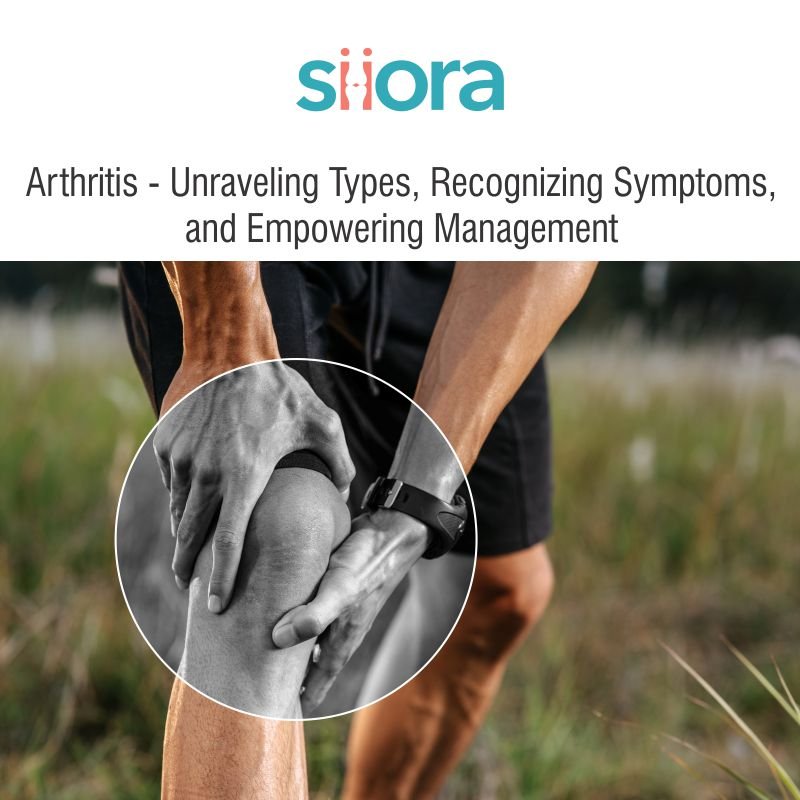Arthritis is a multifaceted condition that affects millions of people worldwide, causing pain, stiffness, and discomfort in the joints. While it might seem like a singular ailment, arthritis encompasses a variety of types, each with its own set of symptoms and challenges. In this exploration, we’ll delve into the intricate world of arthritis, shedding light on its diverse types, recognizing symptoms, and empowering individuals with effective management strategies.
What Are the Different Types of Arthritis?
Understanding arthritis begins with acknowledging its diverse array of types. The two most prevalent forms are Osteoarthritis (OA) and Rheumatoid Arthritis (RA). Osteoarthritis, often associated with aging and wear-and-tear, occurs when the protective cartilage that cushions the ends of bones wears down over time. On the other hand, Rheumatoid Arthritis is an autoimmune disorder where the immune system mistakenly attacks the joints, leading to inflammation and potential joint damage. Here are some of the types of arthritis you must know:
Rheumatoid Arthritis
Rheumatoid Arthritis (RA), in contrast, is an autoimmune disorder where the immune system mistakenly attacks the joints, causing inflammation and potential joint damage. It tends to affect joints on both sides of the body symmetrically and can lead to prolonged morning stiffness, swelling, and joint deformity over time.
Psoriatic Arthritis
Psoriatic Arthritis, intricately linked to the skin condition psoriasis, is another variant characterized by joint pain, swelling, and skin and nail changes. Ankylosing Spondylitis primarily targets the spine, resulting in inflammation and potential fusion of the vertebrae. This can lead to stiffness and reduced mobility in the spine and nearby joints.
Gout
Gout, often associated with lifestyle factors such as diet and alcohol consumption, results from the accumulation of urate crystals in the joints, leading to sudden and severe attacks of pain, swelling, and redness.
Lupus
Lupus-related arthritis is a manifestation of systemic lupus erythematosus, an autoimmune disease affecting multiple organs. Joints become inflamed, causing pain, stiffness, and swelling.
Juvenile Arthritis
Juvenile Arthritis, affecting children under the age of 16, is an umbrella term for various autoimmune and inflammatory joint conditions. It can impact a child’s physical development and quality of life.
What Are the Symptoms of Arthritis?
Arthritis, a pervasive condition affecting joints, unveils itself through a spectrum of symptoms that can vary widely based on the type and severity of the disease. One of the cardinal signs is joint pain, often described as a dull ache or a sharp, stabbing sensation. This pain can range from mild discomfort to debilitating agony, significantly impacting an individual’s daily life.
Swelling
Swelling, another prevalent symptom, accompanies many forms of arthritis. Joints affected by inflammation tend to become visibly swollen, leading to increased stiffness and reduced flexibility. The sensation of warmth around the affected joints is also common, a telltale sign of the inflammatory processes at play within the body.
Morning Stiffness
Morning stiffness is a hallmark symptom, particularly in conditions like Rheumatoid Arthritis. The joints may feel rigid and less responsive, making it challenging to initiate movement after a period of rest. This stiffness often eases with gentle movement and activity throughout the day.
Limited Range of Motion
A reduced range of motion is a frequent consequence of arthritis, impeding the ability to fully bend or straighten affected joints. This limitation can affect various activities, from walking and climbing stairs to more intricate tasks requiring fine motor skills.
Fatigue
Fatigue, though not directly related to joint health, is a pervasive symptom among individuals with arthritis. The persistent pain and inflammation can contribute to an overwhelming sense of tiredness, impacting both physical and mental well-being.
In some cases, arthritis can extend beyond the joints, affecting other organs and systems in the body. Weight loss and fever may accompany certain types of arthritis, indicative of a more systemic impact on overall health.
How to Manage Arthritis?
Living with arthritis necessitates effective management strategies to enhance quality of life and mitigate symptoms. A holistic approach involves a combination of medical interventions, lifestyle modifications, and emotional well-being.
Medication
- Nonsteroidal anti-inflammatory drugs (NSAIDs) can alleviate pain and inflammation.
- Disease-modifying antirheumatic drugs (DMARDs) are often prescribed for autoimmune forms of arthritis to slow down the progression of the disease.
- Pain relievers and corticosteroids may also be recommended depending on the severity of symptoms.
Physical Activity
- Regular exercise is crucial for maintaining joint flexibility and strength.
- Low-impact activities such as swimming, walking, and cycling can be particularly beneficial for individuals with arthritis.
- Strengthening exercises help support the joints and reduce strain.
Lifestyle Modifications
- Maintaining a healthy weight is essential, as excess weight puts additional stress on joints.
- Using assistive devices like braces or canes can provide support and reduce joint strain.
- Adapting the home environment, such as installing handrails and using ergonomic tools, can make daily activities easier.
Nutrition
- A balanced diet rich in anti-inflammatory foods, such as fruits, vegetables, and omega-3 fatty acids, can help manage symptoms.
- Limiting processed foods and excessive alcohol consumption may contribute to overall well-being.
Emotional Support
- Living with arthritis can be emotionally challenging, and seeking support from friends, family, or support groups can be beneficial.
- Mental health practices like mindfulness and stress management can positively impact the perception of pain and overall well-being.
Conclusion
Arthritis is a complex and nuanced condition that requires a comprehensive understanding for effective management. By unraveling its types, recognizing symptoms, and embracing a holistic approach to care, individuals can navigate the challenges posed by arthritis and reclaim control over their lives. Empowered with knowledge and a proactive mindset, those affected by arthritis can foster a better quality of life and continue to pursue their passions despite the hurdles presented by this condition.
About Siora
Siora is a growing orthopedic implant manufacturer in India operating for over 30 years. With hundreds of types of CE-certified trauma implants in its inventory, the company has established a strong position in the international orthopedic market. With an in-house manufacturing unit in the RAI District, Sonepat, Haryana (India), Siora always keeps looking to stretch its boundaries by looking for orthopedic distributors in Jordan, Qatar, Dubai, and more countries. It is also a renowned OEM service provider around the world.








